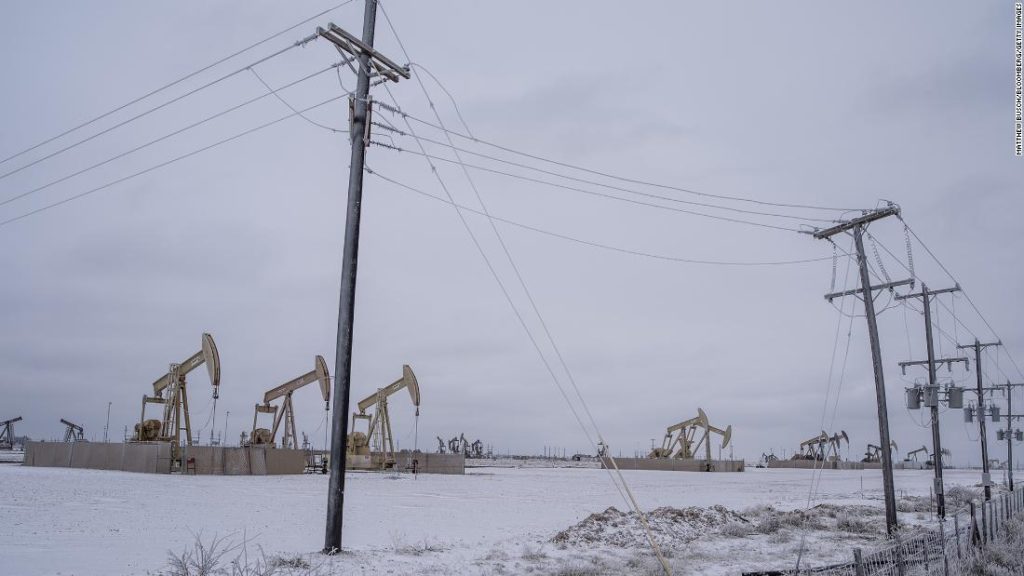This situation could have wide-reaching implications as the US power industry attempts to slash carbon emissions in response to the climate crisis.
In response, Governor Greg Abbott has called for an investigation into the nonprofit Electric Reliability Council of Texas, known as ERCOT, which controls most of the state’s grid. The group’s CEO on Tuesday defended the controlled outages, saying they “kept the grid from collapsing” and sending the state into a complete blackout.
‘Not designed to handle these unusual conditions’
Although some are attempting to pin the blame on one fuel source or another, the reality is that the Arctic temperatures are hobbling fossil fuels and renewable energy alike.
“The extreme cold is causing the entire system to freeze up,” said Jason Bordoff, a former energy official in the Obama administration and director of Columbia University’s Center on Global Energy Policy. “All sources of energy are underperforming in the extreme cold because they’re not designed to handle these unusual conditions.”
The ripple effects are being felt around the nation as Texas’ prolific oil-and-gas industry stumbles.
Prices at the pump are also on the rise. The national average could easily rise 15 cents per gallon over the next week or two, according to Patrick De Haan, head of petroleum analysis at GasBuddy.
Texas is No. 1 in natural gas, oil and wind
Texas is the No. 1 US state in both crude oil and natural gas, according to the US Energy Information Administration. The state accounted for a staggering 41% of America’s oil production in 2019 and a quarter of its marketed natural gas output.
Wind power is also booming in Texas, which produced about 28% of all the US wind-powered electricity in 2019, the EIA said.
But the problem is that not only is Texas an energy superpower, it tends to be an above-average temperature state. That means its infrastructure is ill-prepared for the cold spell currently wreaking havoc. And the consequences are being felt by millions.
It’s not just wind power
Critics of renewable energy have pointed out that wind turbines have frozen or needed to be shut down due to the extreme weather.
And that is significant because almost a quarter (23%) of the power in Texas last year was generated by wind power, according to ERCOT.
Even though other places with colder weather (like Iowa and Denmark) rely on wind for even larger shares of power, experts said the turbines in Texas were not winterized for the unexpected freeze. Cold weather protection like antifreeze and heating elements within the turbine blades and components are not commonly used in Texas.
“That adds cost, so it is cheaper to not have those additional features,” said Jesse Jenkins, an assistant professor at Princeton University who studies energy systems and policy.
But this is not just about wind turbines going down. Natural gas and coal-fired power plants need water to stay online. Yet those water facilities froze in the cold temperatures and others lost access to the electricity they require to operate.
And that’s an even bigger deal to Texas than frozen wind turbines because combined cycle natural gas (40%) and coal (18%) generated more than half of the state’s power in 2020, according to ERCOT.
‘Power prices going to the moon’
“Even if Texas did not have wind power, you would still have power prices going to the moon,” said Matthew Hoza, manager of energy analysis at BTU Analytics.
The problem, according to Hoza, is that a lot of companies in Texas did not invest in cold protection for power plants and natural gas facilities.
“When you’re in West Texas, are you really going to spend money on that equipment?” Hoza said.
Isolated from the national grid
It’s too early to definitively say what went wrong in Texas and how to prevent similar outages. More information will need to be released by state authorities.
Still, some experts say the criticism of wind power appears overdone already.
“In terms of the blame game, the focus on wind is a red herring. It’s more of a political issue than what is causing the power problems on the grid,” said Dan Cohan, associate professor of environmental engineering at Rice University.
Cohan said there was a far greater shortfall in terms of the amount of power Texas was expecting from natural gas than wind.
It’s clear that a wide range of energy sources — from fossil fuels to renewables — were not prepared for the unusual weather in Texas.
“Regions need to rethink the extreme conditions to which they’re planning for and to make sure their systems are designed to be resilient to those,” said Princeton’s Jenkins.
The energy crisis in Texas raises also questions about the nature of the state’s deregulated and decentralized electric grid. Unlike other states, Texas has made a conscious decision to isolate its grid from the rest of the country.
That means that when things are running smoothly, Texas can’t export excess power to neighboring states. And in the current crisis, it can’t import power either.
“When it comes to electricity, what happens in Texas stays in Texas,” Cohan said. “That has really come back to bite us.”
You may also like
-
Afghanistan: Civilian casualties hit record high amid US withdrawal, UN says
-
How Taiwan is trying to defend against a cyber ‘World War III’
-
Pandemic travel news this week: Quarantine escapes and airplane disguises
-
Why would anyone trust Brexit Britain again?
-
Black fungus: A second crisis is killing survivors of India’s worst Covid wave

